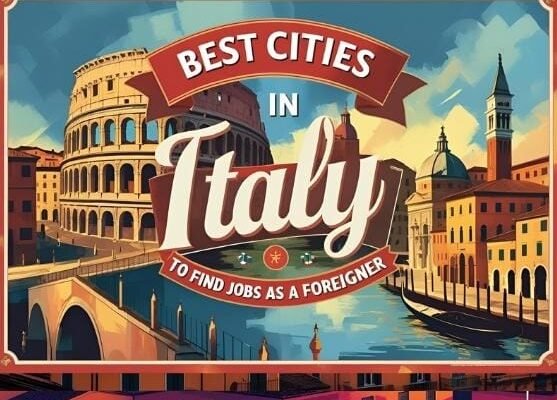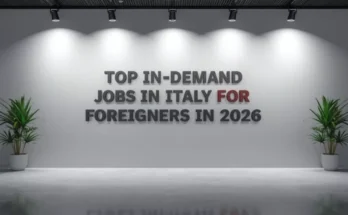Best Cities in Italy to Find Jobs as a Foreigner
Italy’s vibrant culture and varied economy offer a plethora of job opportunities for expatriates. The allure of the Italian lifestyle and the wide range of career options make it a prime destination for professionals worldwide. This article explores the employment landscape in Italy, highlighting the top cities for expat jobs. It draws on Statista’s data on Italy’s expat population and Expat Arrivals’ advice on living in Italy.
Understanding the work visa requirements from the Italian Ministry of Foreign Affairs is crucial for your job search. This knowledge will help you navigate the path to international career success.

Key Takeaways
- Identifying cities in Italy with the highest demand for foreign professionals.
- Overview of Italy’s expatriate demographics and employment trends.
- Exploring cultural experiences that enrich living and working in Italy.
- Essential guidance on navigating the Italian job market as an expat.
- Tips for ensuring compliance with Italy’s employment and visa regulations.
The Economic Landscape of Italy for Expats
Italy’s rich cultural heritage and vibrant economy attract expatriates worldwide. The Italy expat job market has seen growth, especially after the pandemic. Foreigners looking to move to Italy will find diverse opportunities across various industries.

The Italian Job Market Overview
Employment rates in Italy have improved, thanks to sectors that hire many expats. The Italy work visa process is easier for tech and academia professionals. These fields face skill shortages, making them attractive for expats.
Key Industries for Foreigners in Italy
Foreigners can find jobs in tourism, fashion, and manufacturing in Italy. These sectors are crucial to Italy’s economy, with tourism being a major GDP contributor. They seek skilled international workers to meet demand and bring new ideas.
Understanding Local Employment Laws and Visas
Understanding expat employment laws and work visas in Italy can seem complex. Italy’s Immigration Portal provides detailed information on work visas, including the skilled worker visa. Knowing these regulations is essential for expats planning to work in Italy.
Top Industries Hiring Foreigners in Italy
Italy’s job market is alive with opportunities in technology, hospitality, education, and the arts. These Italian job sectors are expanding and actively seeking international talent. This makes expat employment Italy a viable and thrilling option.
The technology sector is booming in cities like Milan and Rome. It demands software developers, IT analysts, and cybersecurity experts. Meanwhile, the hospitality industry, a major draw for expats, thrives in tourist hotspots like Tuscany and Veneto. It offers a range of roles, from hotel management to culinary arts, allowing expats to immerse themselves in local culture while advancing their careers.
- Educational institutions are increasingly valuing international educators who can offer new perspectives and language skills, particularly in English, French, and German.
- The arts sector is another vibrant avenue for expats, with cities like Florence and Venice at the forefront of offering opportunities in museum curation, gallery management, and historical preservation.
Having specific skills—technological proficiency, languages, customer service, or creative credentials—can greatly boost an expat’s job prospects. Therefore, understanding industry-specific jobs in Italy is key to fully leveraging Italy’s diverse employment landscape.
| Industry | Skills In Demand | Potential Cities |
|---|---|---|
| Technology | Software Development, Cybersecurity | Milan, Rome |
| Hospitality | Hotel Management, Culinary Arts | Tuscany, Veneto |
| Education | Language Teaching, International Curriculum Development | Nationwide |
| Arts | Historical Preservation, Gallery Management | Florence, Venice |

Milan: Italy’s Business and Financial Hub
Milan stands out as a global leader in finance, fashion, and innovation. It offers a wealth of opportunities for career advancement. From high-end fashion to cutting-edge tech and robust financial services, Milan is a vibrant hub. It attracts both expats and locals with its diverse job market.
Opportunities in Fashion and Design
Milan is a beacon for world-class fashion and design. It hosts the Milan Fashion Week, a pivotal event that sets global trends. For those pursuing fashion careers in Italy, Milan is the epicenter of luxury brands and innovative design. Roles extend beyond fashion design, encompassing marketing, sales, product development, and fashion technology.
The Booming Tech Scene in Milan
Milan’s tech industry is experiencing rapid growth, backed by significant investments in startups and digital transformation. The city offers a wide range of tech jobs, from fintech and cybersecurity to digital media and big data analytics. It’s becoming a tech powerhouse, drawing talent from across Europe.
Banking and Financial Services Careers
Milan is Italy’s financial capital, home to major banks and multinational financial institutions. It offers a variety of financial jobs, including asset management, corporate banking, investment banking, and fintech solutions. The presence of Banca D’Italia solidifies Milan’s role in monetary strategies and economic policymaking.
| Industry | Key Players | Types of Roles |
|---|---|---|
| Fashion and Design | Luxury Brands, Design Studios | Designer, Marketing, Tech Specialists |
| Tech | Startups, Established Tech Firms | Software Engineer, Data Analyst, UX/UI Designer |
| Financial Services | Banks, Fintech Companies | Risk Manager, Financial Analyst, Compliance Officer |
Rome: Rich in Culture and Tourism Jobs
Rome, the vibrant heart of Italy, is a hub for various career opportunities, especially in tourism, language teaching, and international organizations. For those passionate about history and culture, Rome tourism jobs offer a wide range of possibilities. From guiding tours through ancient ruins to working in upscale hotels, there’s something for everyone. Additionally, language teaching jobs Italy are booming, driven by the local and expatriate demand for English. Meanwhile, Rome international organizations provide rewarding and impactful careers, contributing to global initiatives from this historic city.
For language teaching roles, having certifications like TEFL or TESOL is crucial. These certifications prove your teaching skills and language proficiency. The demand for English and other major European languages ensures a steady supply of teaching positions.
Hospitality and tourism jobs in Rome are lively and involve constant interaction with people worldwide. Positions span from front-of-house roles in boutique hotels to managerial positions in international chains. The city’s rich culinary heritage also offers opportunities in fine dining and event management.
Rome’s international organizations, including UN agencies, attract those interested in international development, environmental affairs, and human rights. These roles require specialized knowledge, a strong service ethos, and the ability to collaborate in diverse teams.
Below, find a detailed table showcasing different job roles along with required qualifications and potential employers within these vibrant sectors:
| Sector | Job Role | Required Qualifications | Potential Employers |
|---|---|---|---|
| Tourism | Tour Guide | Fluency in multiple languages, extensive knowledge of Roman history | Rome City Tours |
| Language Teaching | ESL Teacher | TEFL Certification, Bachelor’s Degree | International Language Schools of Italy |
| International Organizations | Program Analyst | Master’s Degree in International Relations, experience in program management | United Nations Development Programme |
If you’re captivated by the idea of working in Rome, these opportunities promise personal growth and the chance to live in a city rich in history. Whether in tourism, teaching, or international work, Rome offers a fulfilling career path.
Florence: A Haven for Art and Education Professionals
Florence is celebrated for its deep artistic heritage and esteemed educational institutions. It offers unique chances for those seeking Florence art jobs and education careers in Italy. The city’s lively cultural scene attracts art and education professionals globally. It provides a place to work, grow, and flourish in one’s career.
In the realm of expat jobs Florence, the Uffizi Galleries are a leading employer. They seek experts in art restoration, curation, and museum management. The Università degli Studi di Firenze also stands out, hiring for various academic roles. These positions require advanced degrees and proficiency in multiple languages.
The job market in Florence spans both public and private sectors. It leans towards roles enhancing the city’s educational and cultural depth:
- Gallery Administration
- Art Conservation
- Higher Education Teaching
- Educational Program Coordination
For expatriates who love the arts and Italian culture, Florence is unmatched. It’s a place where history and innovation blend, offering rewarding career opportunities. Working in Florence’s art scene means contributing to local culture and Italy’s global arts legacy.
Turin: Italy’s Automotive and Innovation Center
Turin is celebrated for its deep roots in the automotive world, showcasing Italy’s engineering excellence. It’s a symbol of innovation and technological progress. The city is a treasure trove for Turin automotive jobs and a fertile ground for Turin tech startups. It thrives with a mix of historical giants and fresh startups, making it a dynamic center for engineering careers Italy.
For those eager to enter the automotive field, Turin presents a wide array of roles. From design to manufacturing and R&D, the city offers a rich landscape. Its history as a hub for major automotive companies, combined with a growing focus on technology, makes it an ideal place for career advancement.
Turin’s tech scene has seen significant growth, with new startups popping up regularly. This blend of automotive heritage and digital innovation creates unique job opportunities. It attracts tech professionals and engineers looking for exciting challenges.
Let’s take a closer look at the key players in Turin’s industries:
| Company | Sector | Focus Area |
|---|---|---|
| FCA Group | Automotive | Manufacturing and R&D |
| Torino City Lab | Technology | Startup Ecosystem Development |
| Pininfarina | Design | Automotive Design |
| Comau | Automation | Robotic Engineering |
For expatriates looking to join the Turin job market, understanding the local culture and innovative spirit is key. Building a network and being proactive in your career search is essential. Embracing the city’s unique blend of tradition and innovation is crucial for success.
Bologna: A Culinary and Academic City
Bologna is a top choice for those aiming for careers in academia and the culinary arts. It boasts some of Italy’s leading universities, offering numerous Bologna academic careers in education and research. The city’s rich food culture also makes it perfect for culinary jobs in Bologna. This mix of intellectual pursuits and gastronomic delights creates a lively job market, especially for those interested in Italy food industry jobs.
The Università di Bologna, one of the oldest and most respected universities globally, is at the heart of Bologna’s academic scene. It’s a hub for both traditional and innovative studies, offering a wide range of opportunities. Positions include lecturers, researchers, and administrative roles.
- Professorships in various disciplines
- Research roles in scientific and humanitarian fields
- Administrative positions supporting educational excellence
In the culinary world, Bologna’s status as Italy’s gastronomic capital opens up a world of culinary jobs in Bologna. Opportunities range from traditional cooking to cutting-edge food processing, catering to diverse tastes and skills.
- Chef positions in high-end restaurants and local bistros
- Roles in food production and quality assurance
- Management careers in hospitality and tourism
Eataly, a key player in the Italian food industry, showcases the dynamic work environments available. They focus on quality and locally-sourced products, offering promising careers for those skilled in combining tradition with innovation. These roles not only improve culinary skills but also help preserve Italy’s food heritage.
In summary, Bologna is a prime location for Bologna academic careers and Italy food industry jobs. It offers a unique blend of tradition and innovation, making it an ideal place for career growth in both academia and the culinary arts.
Naples: The Heart of Southern Italy’s Economy
Naples stands as a crucial hub in Southern Italy, with a lively Naples job market. It thrives on a diverse economy, from a dynamic service sector to a robust small manufacturing base. This variety offers a wide range of employment opportunities Naples presents, appealing to both locals and expatriates. It’s a place where one can find a unique spot in Southern Italy careers.
The service sector is a key driver of Naples’ economy. It spans from tourism and retail to professional services. These sectors provide strong job opportunities, boosting the region’s economic health. Meanwhile, Naples’ small manufacturing focuses on artisanal goods and traditional crafts. These products reflect the city’s rich cultural heritage and attract tourists and professionals alike.
For those with entrepreneurial dreams, Naples offers a supportive environment. The Naples Chamber of Commerce runs initiatives to help start and grow businesses. These programs offer resources, networking chances, and tailored advice for entrepreneurs at all stages.
Statistics from Regione Campania show the Naples job market’s potential, with an increase in new businesses and investments. This growth is especially notable in tech and innovation sectors. It broadens the range of jobs available, making Naples a prime spot for career advancement and entrepreneurship in Southern Italy.
In essence, Naples is a fertile ground for professional and personal development. Whether you’re starting a business, exploring the tech industry, or contributing to traditional crafts, Naples offers a dynamic environment for growth. It’s a key player in the diverse landscape of Southern Italy careers.
Genoa: A Maritime City with Opportunities
Genoa has been a cornerstone in maritime and logistics for ages, making it a top spot for Genoa maritime jobs and logistics employment in Italy. Its bustling port, overseen by the Autorità di Sistema Portuale del Mar Ligure Occidentale, shines as a beacon for global trade and marine sector jobs.
Genoa is more than a commerce center; it’s a hotbed for research and innovation in marine science. The Istituto Italiano di Tecnologia leads in marine biology, offering marine science careers in Genoa for those eager to aid in environmental conservation and marine life studies.
To land a job in these fields, you’ll need specialized maritime training or advanced degrees in logistics and marine biology. Employers look for a mix of education and hands-on experience, especially in managing complex logistics and marine research.
- Operational roles in shipping and maritime logistics
- Research positions in marine biology and environmental sciences
- Administrative and support roles within port authorities and shipping companies
For those aiming for a career in Genoa’s maritime sectors, the city promises more than just employment. It offers a chance to be part of a globally acclaimed logistical and environmental hub.
Best Cities in Italy to Find Jobs as a Foreigner
Choosing the top Italian cities for expats is a delicate balance between job opportunities and quality of life. Italy’s diverse regions cater to various interests, from the arts to finance and technology. Each area offers unique benefits, enriching the expat experience.
Milan, a northern metropolis, is renowned for its finance and fashion industries. Rome, on the other hand, attracts those passionate about history and tourism. Both cities have large expat communities, providing instant connections for newcomers.
Florence and Bologna, though smaller, are hubs for education and the arts, and culinary arts respectively. Turin is emerging as a tech and automotive innovation center. These cities draw professionals who value Italian culture and lifestyle.
Naples offers a lower cost of living and is key in logistics and heritage conservation. Genoa specializes in maritime and ecological fields. The mix of professional opportunities and cultural richness in these cities is a major attraction for expats.
Choosing the right city involves more than just the availability of jobs; it’s about finding a place that resonates with your personal and career aspirations.
Here is a breakdown of the key factors in some of Italy’s work destinations:
| City | Pros | Cons | Expat Community Size |
|---|---|---|---|
| Milan | High wage levels, advanced career opportunities in fashion and finance | Higher living costs | Large |
| Rome | Rich in culture, abundance of tourism and historical preservation roles | Job market competition is stiff | Significant |
| Florence | Center for arts and academics | Smaller job market | Medium |
| Bologna | Rising opportunities in academia and culinary sectors | Can be overshadowed by larger cities | Medium |
| Turin | Growing tech and automotive industries | Industrial cityscape might not appeal to all | Growing |
| Naples | More affordable, rich heritage | Lower average income levels | Medium |
| Genoa | Specializations in marine and environmental sciences | Limited in other industries | Smaller |
Each city not only fosters career growth but also offers a genuine Italian experience. They are among the best Italian job search cities for expats seeking both professional and personal fulfillment.
Skills and Languages: Boosting Your Employability in Italy
To boost your employability in Italy, mastering the Italian language and obtaining relevant work certifications are crucial. Speaking the local language eases daily interactions and significantly improves your professional prospects. Possessing specific certifications can also set you apart in the competitive job market.
Learning Italian: A Key Factor for Success
Acquiring Italian language skills is more than just a communication tool. It’s a bridge to understanding Italy’s rich cultural nuances and professional etiquettes. Courses at respected institutions like Scuola Leonardo da Vinci offer structured learning paths. They ensure you gain proficiency suited for the workplace.
Certifications and Skills In-Demand
Next to language proficiency, work certifications in Italy play a pivotal role. Fields such as IT, project management, and healthcare often require specific certifications. These certifications validate your expertise and commitment to your profession. Platforms like LinkedIn Learning offer courses popular among professionals looking to upskill and acquire new certifications conducive to career growth in Italy.
- Project Management Certification: PMP
- IT Certifications: Cisco, CompTIA
- Health and Safety: NEBOSH
- Language Proficiency: CILS (Certification of Italian as a Foreign Language)
Combining Italian language skills with the right certifications can dramatically improve your employability in Italy. This allows you to compete effectively in the Italian job market.
Networking and Cultural Integration
For expatriates moving to Italy, success in both personal and professional spheres often depends on two key areas: expat networking Italy and cultural integration Italy. Understanding and navigating through the network-rich environments and the distinctive Italian business culture can significantly ease the transition and enhance career prospects.
The Professional Women’s Association of Milan emphasizes networking as a critical step for those new to the Italian market. Events organized by such associations offer tremendous opportunities to meet industry peers, find mentors, and understand market dynamics firsthand.
Italian business culture places a strong emphasis on interpersonal relationships, and thus, networking allows for a deeper understanding of these cultural subtleties. Engaging with local businesspeople and expatriates alike aids in swiftly assimilating into the Italian way of life and business, enhancing one’s professional image and effectiveness.
Forbes notes that business etiquette in Italy can be quite formal. It advises expatriates to invest time in learning local customs and the importance of appearances in professional settings. Respecting these cultural nuances can be as critical as your professional expertise in forging long-lasting business relations.
One of the most effective strategies to sustain cultural integration Italy is regular engagement. Participating in local events, attending workshops, and embracing daily interactions with locals will promote a deeper cultural understanding and appreciation, essential components of successful integration.
Thus, both expat networking in Italy and thorough cultural integration are not just beneficial, but vital for expatriates. They not only pave the way for professional growth but also ensure a smoother, more enjoyable Italian living experience.
Conclusion
Moving to Italy for work is more than a career shift—it’s embracing a lifestyle full of cultural depth and professional development. Italy’s cities, each with its own distinct job market and thriving sectors, present a wide range of opportunities for expats. Milan’s finance and tech scenes, Rome’s tourist attractions, Florence’s artistic heritage, and Turin’s automotive innovation all await.
Italy expat job advice often highlights the value of diving into local culture and learning the language. This can open doors to numerous opportunities and ease your integration into Italian society. This article has explored various paths, from teaching English in Rome to engineering in Turin. It also stressed the need for skill updates and networking to boost your employability in this Mediterranean paradise.
For those looking to find a job in Italy, the journey promises discovery, challenges, and triumphs. The Italian job market offers not just career growth but also a better quality of life. Italy’s rich history, delicious cuisine, and breathtaking landscapes add color to your life. As you prepare for this exciting chapter, remember that Italy’s diverse professional landscapes are ready for you to explore. They offer the canvas for painting your own unique vocational story.



